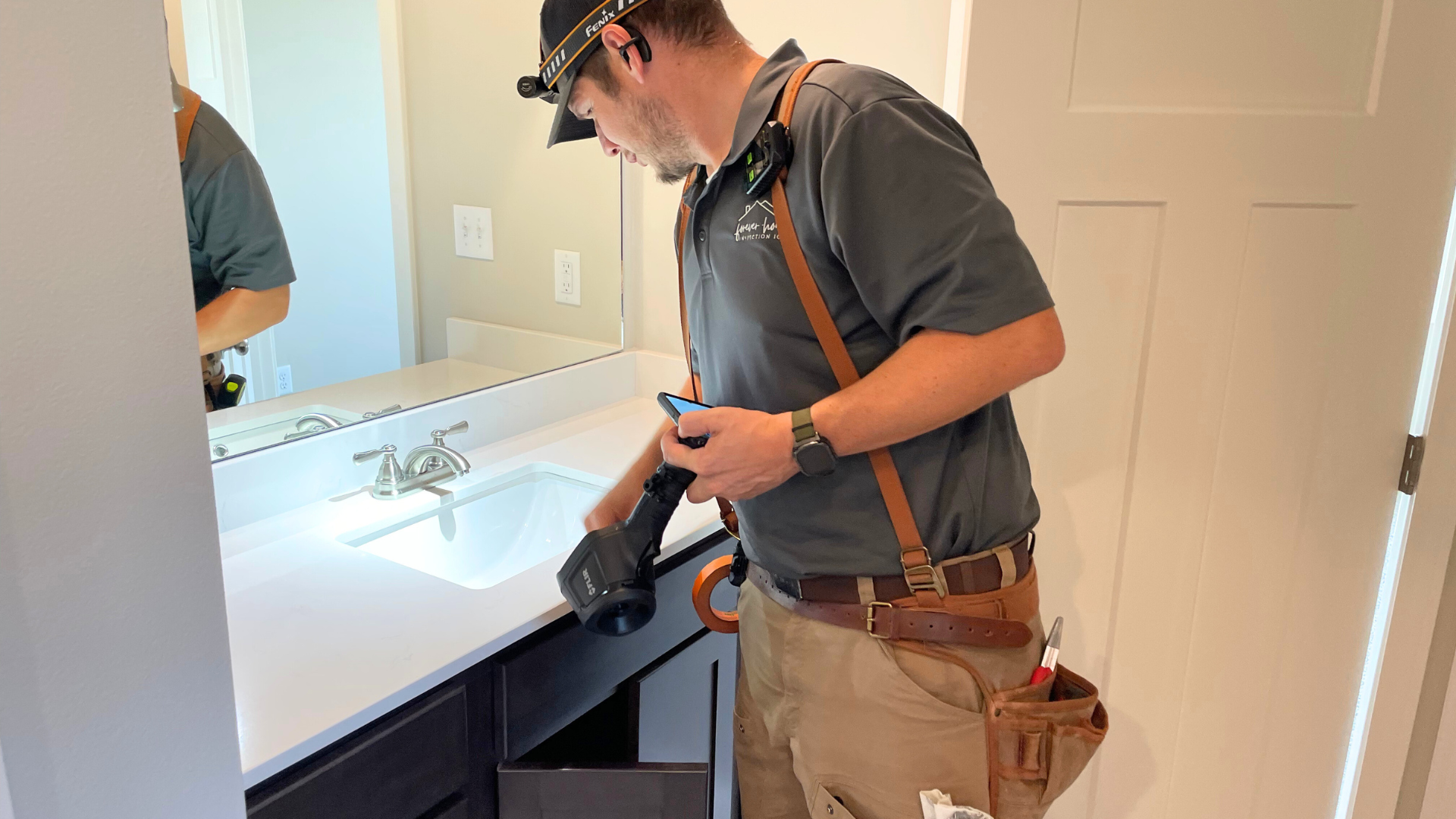Appraisal Versus Inspection: Know the Key Differences
Buying a home? It’s important to understand the difference between an appraisal versus inspection. An appraisal assesses the market value of the property, while an inspection checks the physical condition of the house. Both are crucial but for different reasons. This article will help you understand why you need both.
Key Takeaways
Home appraisals are for figuring out how much your soon-to-be dwelling is worth, while home inspections are basically a checklist for all the things that could go wrong with it.
Spoiler alert: Appraisals don’t fix your leaky roof, and inspections won’t get you a bigger mortgage. They’re not interchangeable, despite what your friend who’s ‘been through the process’ might think.
If you skip the home inspection, good luck convincing that ghost of a bad investment that it doesn’t haunt you… because that’s exactly what skipping it will do.
Understanding Home Appraisal and Inspection
To understand home appraisal and inspection, we must recognize their distinct purposes. A home appraisal is a detailed assessment conducted to determine a property's fair market value, carried out by a licensed appraiser. This article will provide an in depth comparison of appraisal versus inspection.
On the other hand, a home inspection evaluates a property's physical condition, focusing on major systems and safety issues, performed by a certified home inspector. Both processes are vital in protecting financial interests and ensuring a smart home purchase. However, they serve different roles and offer unique insights into the property's value and condition.
What is a home appraisal?
A home appraisal functions like the Sherlock Holmes of real estate, aiming to determine a property’s value using various methods and factors. Conducted by a licensed professional appraiser, this assessment involves a deep dive into the property’s features, such as finishes, layout, and overall condition, as well as current market trends. During an appraisal, an appraiser evaluates the home in person to estimate its worth. The appraiser checks:
The home’s condition
The home's features
Square footage
Number of bedrooms and bathrooms
Overall condition
The appraisal process involves a meticulous review of comparable sales in the neighborhood to establish the home's appraised value and the property's fair market value. The appraiser determines the home's appraised value based on these factors, which helps confirm the home's value for both buyers and lenders. This final appraisal report is essential for mortgage lenders to verify the home's value and the property's fair market value before issuing loans. It’s a critical step in the home buying process.
What is a home inspection?
If the home appraisal is Sherlock Holmes, then the home inspection is Dr. House. This process evaluates a home’s condition, including the home's structure and major systems, by a certified home inspector. Its goal is to identify potential issues that may need attention before finalizing the purchase.
The home inspector focuses on the functionality and safety of the property, examining everything from the roof to the basement, including electrical systems, the home's structure, and plumbing. After the on-site visit, home inspectors will provide you with a detailed home inspection report highlighting all the issues and recommended repairs.
Key Differences Between Home Appraisals and Inspections
Though both appraisal and inspection are essential, they serve distinct purposes. A home appraisal evaluates the property’s market value, while a home inspection focuses on its physical condition. These processes are often mistakenly viewed as interchangeable, but each has a unique role in home buying.
Understanding these key differences can save you a lot of headaches and ensure you make informed decisions during your homebuying journey.
Process Overview
During an appraisal, the appraiser conducts a walk-through and researches comparable sales to create a final report. Usually, the lender selects the appraiser to ensure impartiality.
On the other hand, a home inspection involves an on-site visit where the inspector evaluates major systems and safety issues. Appraisals and inspections, though often scheduled close together, function independently. Both appraisals and inspections can occur during the escrow period after an offer is accepted.
Outcomes and Reports
An appraisal results in a detailed report with the home’s appraised market value, photos, and descriptions of comparable sales. This final report is crucial for lenders and buyers to confirm that the property’s value aligns with the loan amount requested.
A home inspection yields a detailed report highlighting all identified problems. This inspection report is a valuable tool for buyers and sellers whose homes have sold recently to negotiate repairs or other contingencies before finalizing the inspection results home sale. The buyer's inspection report provides leverage to negotiate repairs, credits, or lower prices with the seller.
While both reports are crucial, they address different aspects of the homebuying process.
Inspection and Appraisal Costs
When it comes to the home buying process, understanding the costs of both home inspections and home appraisals is key to avoiding sticker shock. A typical home inspection will set you back anywhere from $500 to $1,000, depending on factors like the property’s size, age, and location. While this might seem like just another expense, it’s a small price to pay for the peace of mind that comes from knowing exactly what you’re getting into—think of it as insurance against surprise repairs down the road.
On the flip side, a home appraisal usually costs between $300 and $1,500, with the final price tag influenced by the property type and where it’s located. Most of the time, home buyers are responsible for footing the bill for both the home inspection and the home appraisal, though there’s sometimes room to negotiate with the seller. Keep in mind, mortgage lenders often require an appraisal as a condition for approving your loan, so skipping it isn’t really an option if you’re financing your purchase.
Factoring in these costs early on helps home buyers make informed decisions and budget accordingly, ensuring there are no unwelcome surprises as you move closer to owning your new property.
The Role of Home Appraisals in Real Estate Transactions
Home appraisals play a pivotal role in real estate transactions. Lenders often require a real estate appraisal to confirm a property’s fair market value, the home's value, and the home's appraised value before approving loans. This step protects the lender’s investment and ensures the loan amount is suitable for the property’s value. Mortgage lenders such as Quicken Loans rely on appraisals to make informed lending decisions.
The benefits of an appraisal extend beyond just lender protection. They give buyers confidence by independently verifying the property’s value during the home purchase process. If the appraisal comes in below the offer price, it can impact negotiations between the buyer and seller. The Federal Housing Administration and Veterans Affairs require specific appraisals for FHA and VA loans, respectively.
When is an appraisal required?
Appraisals are generally required for mortgages to provide lenders with a property valuation. Lenders use these appraisals to evaluate whether the property’s value aligns with the requested loan amount. A low appraisal can jeopardize loan acquisition and create challenges for the buyer. A low appraisal can jeopardize the deal or require the buyer to increase their down payment.
Benefits of an appraisal
The primary benefit of an appraisal is to protect both lender and borrower by ensuring a fair property value. It helps establish fair market value, protecting lenders from financial losses due to overvaluation. For buyers, appraisals ensure well-informed investment decisions.
In refinancing, lenders often require appraisals to confirm the home’s current market value. Overall, an appraisal ensures accurate property value assessment and protects all parties.
Understanding the Appraisal Report
The appraisal report is more than just a formality—it’s a crucial document that can make or break your home buying process. Prepared by a licensed appraiser, this report offers an independent, professional opinion of the property’s fair market value. It includes a detailed analysis of the home’s condition, size, and location, as well as a comparison to recent sales of similar properties (those all-important comparable properties).
Mortgage lenders rely on the appraisal report to determine how much they’re willing to lend, making it a pivotal piece of the puzzle. As a home buyer, it’s essential to review the appraisal report carefully to ensure it accurately reflects the property’s condition and market value. If you spot any discrepancies or issues, you may have the opportunity to negotiate with the seller to address them before moving forward.
By understanding what’s in the appraisal report and how it impacts your loan and purchase, you’ll be better equipped to make informed decisions and avoid potential pitfalls in your home buying journey.
The Importance of Home Inspections for Buyers
Home inspections are vital for buyers, revealing potential repairs that impact safety and investment value. A thorough inspection can uncover hidden defects, affecting negotiations during the buying process. An inspection allows the buyer to walk away from the deal without losing earnest money if significant problems arise.
A home inspection can prevent significant financial burdens for home buyers later on, including expensive repairs. Buyers who skip inspections risk inheriting costly issues after the purchase.
When should you get a home inspection?
On average, home buyers have 10 days to complete the home inspection after the offer is accepted. This timing is critical as it can influence negotiations if issues are discovered. Most buyers choose to get a home inspection even though it’s not legally required.
FHA and VA loans require home inspections, while conventional financing is strongly recommended.
When choosing a home inspector, consider asking family members for recommendations and checking online reviews to find a reliable professional. Both appraisers and inspectors require integrity and strong communication skills to succeed.
Benefits of a home inspection
The main benefit of a home inspection is identifying hidden issues and aiding in negotiations. Inspection reports detail maintenance and safety issues, potential risks, and repair recommendations.
This insight is crucial for decision-making, ensuring awareness of significant issues before finalizing the purchase.
Real Estate and Finance
Real estate and finance go hand in hand, and understanding how they intersect is vital for home buyers. Mortgage lenders are central players in the home buying process, setting requirements for both appraisals and home inspections based on the type of loan and the property’s specifics. Whether you’re applying for a VA loan, FHA loan, or a conventional mortgage, each comes with its own set of rules and expectations.
It’s important for home buyers to work closely with their mortgage lender to understand exactly what’s required for their situation. Knowing the key differences between an appraisal and an inspection—and the costs associated with each—will help you make informed decisions and avoid unnecessary delays or expenses.
By doing your homework, asking the right questions, and partnering with experienced real estate professionals, you can navigate the home buying process with confidence. Remember, a little knowledge goes a long way in ensuring your investment is sound and your path to homeownership is as smooth as possible.
Similarities Between Appraisals and Inspections
Despite their differences, appraisals and inspections share some similarities. Both the appraisal vs inspections provide unbiased evaluations by certified professionals. They complement each other by assessing different property aspects. The work schedules for both appraisers and inspectors offer flexibility and opportunities for independence.
Together, they ensure both the home’s physical condition and home value meet expectations.
Certified professionals
Appraisers and inspectors are certified professionals with extensive training. They act as impartial third parties, providing a professional opinion that significantly influences real estate transactions.
The appraisal process requires a licensed professional to conduct an unbiased assessment based on established criteria.
Buyer involvement
The buyer plays a significant role in both processes. Buyers pay for both home inspections and appraisals. The buyer also selects the home inspector, controlling who evaluates the property’s condition. Buyers pay for both appraisals and home inspections, unless negotiated otherwise.
How to Choose Between Appraisal and Inspection
While choosing between an appraisal and an inspection can be tricky, it’s widely recommended to get both when buying a home. Each process serves a different purpose, and together they offer a comprehensive understanding of the property’s value and condition.
Situations favoring appraisals
Appraisals serve as a necessary step for securing mortgages from mortgage companies, as they determine the property’s fair market value. Exceptions include certain refinancing options and appraisal waivers, but generally, lenders require appraisals to protect their investments.
Cash buyers aren’t required to get an appraisal, but many do so for peace of mind regarding property value.
Situations favoring inspections
Home inspections are essential for identifying safety issues and potential repairs that may require repairs, as well as addressing safety hazards. Waiving the home inspection contingency may help buyers win the house, but it increases financial risks.
Typically, the home inspection occurs before the appraisal to identify issues that may impact the selling price.
Common Misconceptions About Appraisals and Inspections
Many misconceptions exist about appraisals and inspections. A common misconception is that an appraisal can substitute for a home inspection, which isn’t true. Each process has a unique role and importance in home buying.
Can an appraisal replace an inspection?
Appraisals and inspections have distinct purposes. An appraisal assesses market value, while a home inspection evaluates physical condition. Thus, a home appraisal cannot replace a home inspection.
Both are crucial in home buying, focusing on financial value and safety/repairs, respectively.
Do both processes happen simultaneously?
Appraisals and inspections can be scheduled around the same time. However, they are independent with distinct outcomes. Understanding that appraisals assess market value and inspections evaluate a home’s condition is crucial for buyers.
Summary
In the chaotic symphony of the home buying process, understanding the distinct roles of appraisals and inspections is crucial. Appraisals help determine the property’s fair market value, ensuring that the mortgage lender’s investment is protected and giving buyers a clear picture of what they’re getting into financially. On the other hand, home inspections dive deep into the property’s physical condition, identifying potential safety issues and necessary repairs that could impact your living experience and future costs.
By leveraging both these evaluations, you can navigate the homebuying journey with confidence, making informed decisions that protect your financial and personal interests. So, the next time someone tells you that an appraisal and an inspection are the same, feel free to laugh in their face—politely, of course.
Home Inspectors Serving Iowa: From Granger to Des Moines
Forever Home Inspection Iowa is a local, certified, and insured company emphasizing ethics and client care. Built on love and loyalty, we ensure every inspection is thoroughly done, which accompanies a highly detailed, digital report and warranty.
Primarily serving homebuyers and sellers within 60 miles of the Des Moines, Iowa area, we’re flexible and purposeful in meeting client needs.
Our team operates throughout Central Iowa, ensuring quality inspection services in areas all the way from Granger to Des Moines.
We serve both urban and rural Iowa communities, providing top-notch inspections for both residential and commercial properties.
Our services include surrounding communities like Johnston, Grimes, and others in the region.
Our commitment to comprehensive, dependable inspections extends throughout Central Iowa, ensuring all residents have access to quality inspection services.
We continually strive to meet the diverse needs of Iowan homebuyers and sellers, maintaining excellence in home inspections and helping our fellow citizens across Central Iowa make informed real estate decisions!
How to Schedule Your Home Inspection
Scheduling a home inspection with Forever Home Inspection Iowa is easy. Book your inspection with a phone call or online. Many clients and real estate agents praise our team’s responsiveness and the ease of scheduling through our website.
Not only are we experts our field, but all of our qualifying inspections include a free warranty for even more peace of mind in your homebuying journey. We are confident you will LOVE partnering with us!
After scheduling, you’ll receive an email with a link to a custom inspection portal containing all important documents and payment options. Expect your inspection to last between two to four hours, depending on your property’s size and condition. It’s a seamless process designed with your convenience at the forefront.
Reviews From Happy Homebuyers
Matt and Kalyn Gibson, owners of Forever Home Inspection Iowa
Frequently Asked Questions
What is the main difference between a home appraisal and a home inspection?
You thought a home appraisal and a home inspection were the same? Spoiler alert: an appraisal is all about the dollar signs, while an inspection plays detective, sniffing out all the things that could go wrong with your future money pit.
When is a home appraisal required?
Whenever you're trying to convince a bank to give you a giant loan—because apparently, the property's value needs to play nice with what you're asking for. Who knew money had such high expectations?
Can an appraisal replace a home inspection?
An appraisal definitely can't replace a home inspection.
What are the benefits of a home inspection for buyers?
Oh, you know, just the usual perks of avoiding a money pit—like learning about hidden repairs, safety hazards, and maintenance issues before you hand over your life savings.
Do appraisals and inspections happen simultaneously?
Absolutely. While they can happen around the same time, appraisals and inspections are about as independent as you can get.
Want More?
Check out other posts we’ve written.






